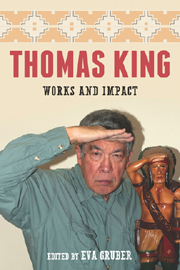Book contents
- Frontmatter
- Contents
- Preface
- Introduction
- Part 1 Works
- Part 2 Impact
- Part 3 Approaches
- Part 4 Encounters
- 16 Storytelling in Different Genres: A Conversation with Thomas King
- 17 Thomas King and the Art of Unhiding the Hidden
- 18 The Truth about Thomas
- 19 Misdirection Is Still a Direction: Thomas King as a Teacher
- 20 Tom King and the Dead Dog Café
- 21 Dead Dog Café: Being an Indian on Air
- Part 5 Thomas King—A Bibliography
- Notes on the Contributors
- Index
21 - Dead Dog Café: Being an Indian on Air
from Part 4 - Encounters
Published online by Cambridge University Press: 05 February 2013
- Frontmatter
- Contents
- Preface
- Introduction
- Part 1 Works
- Part 2 Impact
- Part 3 Approaches
- Part 4 Encounters
- 16 Storytelling in Different Genres: A Conversation with Thomas King
- 17 Thomas King and the Art of Unhiding the Hidden
- 18 The Truth about Thomas
- 19 Misdirection Is Still a Direction: Thomas King as a Teacher
- 20 Tom King and the Dead Dog Café
- 21 Dead Dog Café: Being an Indian on Air
- Part 5 Thomas King—A Bibliography
- Notes on the Contributors
- Index
Summary
Dead Dog CafÉ. The success of this radio program is what could be called a cultural phenomenon, as it was an unexpected hit despite its low budget, a political climate where instead of the action of the Oka crisis we were numbed by the Royal Commission on Aboriginal Peoples, and the show's content and style. The program seemed to connect to a common goodness and sensibility of the general Canadian population and to meet the tastes of listeners to CBC radio and some Native radio stations, in particular to CHON FM in the Yukon. This was a surprise to me, and it taught me that the tastes of an audience are hard to predict, as I have been involved with the arts in Canada for a number of years and at no time was I involved in any project that had Dead Dog's popularity.
I remember that for the first few episodes of Dead Dog, the listening audience seemingly did not know how to react. There was a silence, then a few grumbles and complaints from both non-Native and Native listeners. The complaints were that we sounded amateurish, unpolished, that we did not have the smooth delivery of polished professionals. To me, this was another way of saying that we sounded like “Indians.” In other words, how dare we foul the wonderful airwaves sounding like Indians! The Canadian government had spent decades and millions of dollars trying to eradicate our Indianness by enacting repressive policies, residential schools, taking away our traditional lifestyles—yet there we were in all our colonized glory, on air, and being paid at that.
- Type
- Chapter
- Information
- Thomas KingWorks and Impact, pp. 314 - 316Publisher: Boydell & BrewerPrint publication year: 2012



